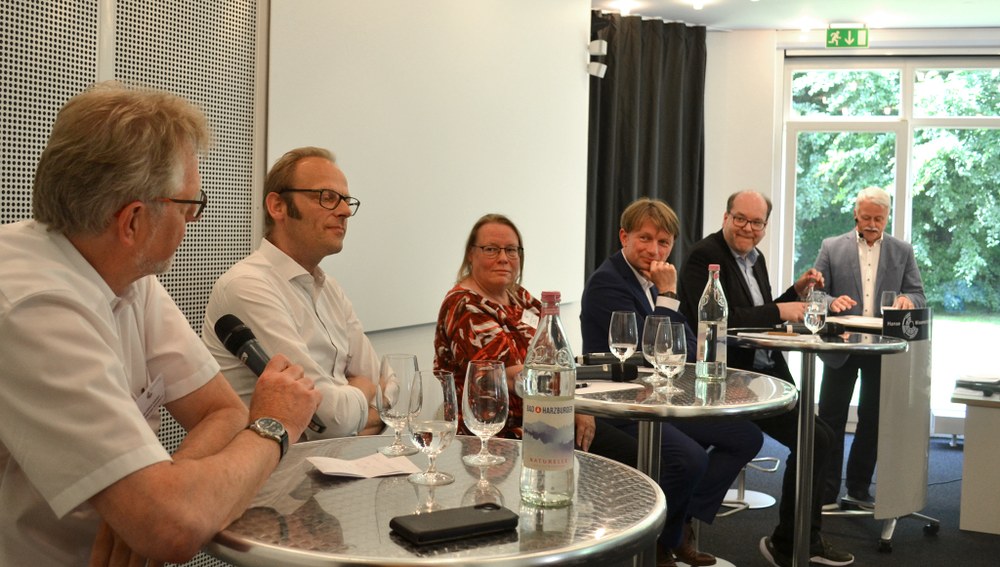"Making the energy system more flexible is the central challenge of energy transition"

- The international conference „Energy Systems Stability 2040 and beyond“ took place on 15./16. June 2023 at the Hanse-Wissenschaftskolleg in Delmenhorst.
- At the concluding panel discussion, Institute Director Prof. Carsten Agert emphasised the flexibilisation of the energy system as a central challenge of the energy transition.
- The Institute of Networked Energy Systems organised the event with 60 experts from science and industry.
- Focus: Energy, sector integration
"If an energy system powered by sun and wind is to be efficient and secure, we need to give it flexibility. We will find this in hydrogen storage and batteries as well as in making demand more flexible." This was emphasised by Institute Director Prof. Carsten Agert on Friday, 16 June 2023, at the panel discussion on the international workshop "Energy Systems Stability 2040 and beyond" at the Hanse-Wissenschaftskolleg in Delmenhorst, Lower Saxony. "It is a central challenge of the energy transition to drive the development of these three aspects technically, economically and regulatory," he said. The discussion led by former German news (ZDF) environmental expert Volker Angres was the public conclusion of the previous two-day specialist event, in which more than 60 experts from science and industry had participated.
While the course of energy transition so far has been characterised by feeding renewable energies into an existing energy system, it is now increasingly a matter of adapting the system in its technical and economic nature to the changed feed-in structures. In particular, making demand more flexible offers a lot of potential for cost-neutral solutions: If, for example, the electric car were to communicate with the power grid, it could be charged in self-selected time windows when it puts the least strain on grid capacities. Alternatively, the lack of flexibility would have to be compensated by larger transformers and hydrogen storage, which would be extremely expensive. "So it would also work without flexibilisation, but we only get 'elegant and cheap' through digitalisation, automation and flexibilisation of demand. And that is exactly what we are working on," Agert clarified.
What the transformation should mean for all of us: We will need constant optimisation of the balance of electricity supply and consumption - every second. This requires a lot of data from countless measuring points and sensors. The aspects of data protection and data security will play a major role here. Prof. Johanna Myrzik, Head of the Institute for Automation Technology at the University of Bremen, explained the importance of digitalisation in the transformation of the energy system. It is not just a matter of meeting the current demand for electricity from renewable energies in the future. Rather, further capacities would also be needed, for example for electromobility and the production of hydrogen. "In order to optimise this increase in electrical consumers, we need mathematical methods from artificial intelligence to minimise the grid expansion as best as possible," she explained.
Dr Patrick Jochem described very recent impressions of the 1st Symposium of Energy Research Networks, to which the Federal Ministry of Economics and Technology had invited almost simultaneously with the Delmenhorst workshop in Berlin. The head of the Energy Systems Analysis Department at the Institute for Networked Energy Systems took part in both events and confirmed via video message: "Just as in Delmenhorst, we have also identified in Berlin: Time is pressing to design the energy markets in such a way that the technological solutions already available are brought to market as quickly as possible."
The idea of "not just talking, but doing" was also taken up by Lower Saxony's Minister for the Environment, Energy and Climate, Christian Meyer: "We do have the solutions, we just have to implement them. We have the chance to achieve a favourable free and independent energy system. That's why we are fighting to become climate neutral as soon as possible."
About the Hanse-Wissenschaftskolleg:
The Hanse-Wissenschaftskolleg (HWK) is a non-profit foundation of the federal states of Bremen and Lower Saxony and the city of Delmenhorst. As an independent Institute for Advanced Study, it promotes excellent science through fellowships for scientists, artists and authors from all over the world as well as through scientific events. To this end, it cooperates with the universities of Bremen and Oldenburg and other scientific institutions in the Northwest region.
Further Information:
